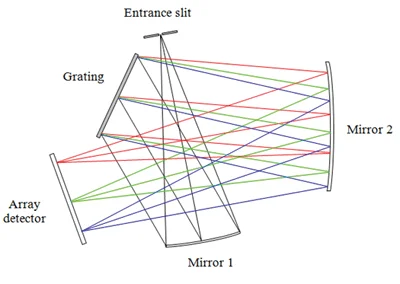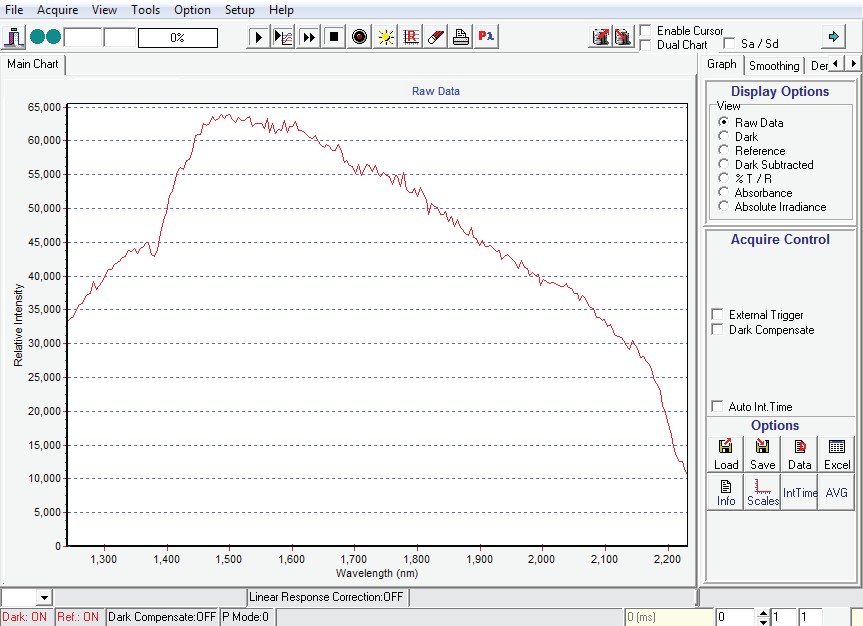B&W Tek’s Sol™ 2.2A is a high-performance linear InGaAs array spectrometer that features 256 pixels and offers a wide dynamic range and high throughput, with TE cooling down to −15 °C through an integrated three-stage cooler.
All spectrometers feature a built-in 16-bit digitizer and an SMA 905 fiber optic input, while being USB 2.0 plug-and-play compatible. The integrated autozero function automatically decreases dark non-uniformity and dark current, leading to an enhanced signal-to-noise ratio.
Software control enables users to select from four kinds of operation modes—Maximum Sensitivity, Maximum Dynamic, High Sensitivity and High Dynamic. Besides this, custom-made spectral resolution and application support are available.
Applications
- On-line analyzer
- Quality control
- NIR spectroscopy
- Process monitoring
- Material identification
Features
- Thermoelectric cooling of −15 °C
- Spectral range from 900 to 2200 nm
- Integrated autozero (noise level reduction)
- Excellent resolution of 9.0 nm
- Four sensitivity and dynamic range modes to suit particular application requirements
Accessories
- Fiber sample holders
- Fiber patch cords
- Fiber sampling probes
- Light sources
Thermoelectric Cooler
An effective way to decrease noise and dark current is to cool an array detector with an integrated thermoelectric cooler (TEC). This method also improves the dynamic range and detection limit.
When the TEC is used to cool the InGaAs array detector from a room temperature of 25 °C down to −15 °C, the dark current is decreased by approximately 32 times, while the dark noise is decreased by around 5.7 times. This enables the spectrometer to detect weaker optical signals and function at longer exposure times.
Specifications
Table 1. Source: B&W Tek
| . |
. |
| DC Power Input |
5 V DC @ 5 amps |
| AC Adapter Input |
100 - 240 VAC 50/60 Hz, 1.0 A @ 120 VAC |
| Detector Type |
Linear InGaAs Array |
| Pixels |
256 x 1 @ 50 µm x 250 µm per element |
| Spectrograph f/# |
3.5 |
| Spectrograph Optical Layout |
Crossed Czerny-Turner |
| Dynamic Range |
Maximum Dynamic mode: 25,000:1
High Dynamic mode: 12,500:1
High Sensitivity mode: 12,500:1
Maximum Sensitivity mode: 1,700:1 |
| Digitizer Resolution |
16-bit or 65,535:1 |
| Readout Speed |
500 kHz |
| Data Transfer Speed |
>300 spectra per second via USB 2.0 |
| Integration Time |
250 µs to >= 64 Seconds |
| External Trigger |
Aux port |
| Operating Temperature |
0 °C - 35 °C |
| TE Cooling |
Three-Stage: -15 °C @ relative humidity = 90% |
| Weight |
~ 3.1 lbs (1.4 kg) |
| Dimensions |
7.5 in x 4.3 in x 2.7 in (192 mm x 109 mm x 68 mm) |
| Computer Interface |
USB 2.0 / 1.1 |
| Operating Systems |
Windows: 7, 8, 8.1 (32-bit & 64-bit) |
Spectrograph

Image Credit: B&W Tek
Entrance Slit
Table 2. Source: B&W Tek
Slit
Option |
Dimensions |
Approximate Resolution
1100 - 2200 nm |
| 50 µm |
50 µm wide x 1 mm high |
~9.0 nm |
| 100 µm |
100 µm wide x 1 mm high |
~18.0 nm |
| Custom slit widths available |
Diffraction Grating
Table 3. Source: B&W Tek
Spectral
Coverage (nm) |
Grating |
Approximate Resolution
50 µm Slit |
| 1100-2200 |
100/1600 |
9.0 nm |
| 900-2200 |
85/1350 |
15.0 nm |
| Custom configurations available |
Software
The spectral data acquisition software, BWSpec®, features a broad range of tools developed to execute complex calculations and measurements at the touch of a button. The software enables users to select between multiple data formats and optimize scanning parameters, like the integration time.
Besides powerful data processing and data acquisition, the BWSpec® includes other features like manual/automatic baseline correction, spectrum smoothing and automatic dark removal.

Image Credit: B&W Tek